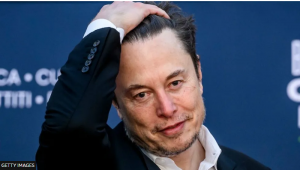The mother of murdered teenager Brianna Ghey has said she is “open” to speaking to the mother of one of her daughter’s killers.
Esther Ghey told Sunday with Laura Kuenssberg she wanted the mother of Scarlett Jenkinson to know she did not blame her for what happened.
“If she ever wants to speak to me, I’m here,” she said.
In an emotional interview, Ms Ghey said she would like to understand “how their life was, and what they went through”.
“I also want her to know that – I understand how difficult being a parent is, in this current day and age, with technology and phones and the internet, and how hard it is to actually monitor what your child is on,” she said.
Jenkinson, who killed Brianna with Eddie Ratcliffe, had watched videos of violence and torture on the dark web.
They plotted the murder using messaging apps.
Speaking for the first time since the killers’ sentencing, Ms Ghey said: “You can always look back and wish that you’d done things differently and maybe if I had done things differently, then this wouldn’t have happened.”
Esther Ghey wants a law introduced so under 16s cannot access social media on their phones
Ms Ghey called for the government to stop children having access to social media apps on smartphones, calling the internet the “Wild West”.
She said it was “just not doable” for parents to check what children were seeing online.
Ms Ghey, who is launching a petition to demand the changes, also wants companies to flag searches of inappropriate material, like the videos Jenkinson saw, to parents.
She said: “We’d like a law introduced so that there are mobile phones that are only suitable for under-16s.
“So if you’re over 16, you can have an adult phone, but then under the age of 16, you can have a children’s phone, which will not have all of the social media apps that are out there now. And also to have software that is automatically downloaded on the parents’ phone which links to the children’s phone, that can highlight key words.
“So if a child is searching the kind of words that Scarlett and Eddie were searching, it will then flag up on the parent’s phone.”
During the interview, she said she believed “without a doubt” that Brianna would not have been killed if such safeguards were already in place, adding that “they wouldn’t have been searching that in the first place. And if they did search it then the parents would know and to be able to get them some kind of help.”
Ms Ghey also said that she had struggled to monitor what Brianna was consuming online – and that she had accessed pro-anorexia and self-harm material.
She said her daughter was “very protective over a phone – it was the cause of a lot of arguments. I can imagine that in most households, this will be the case too. If she couldn’t have accessed the sites, she wouldn’t have suffered as much.”
She told the BBC it was very powerful watching Mark Zuckerberg being confronted by bereaved American parents at a fiery hearing in the US Senate and said “greed needs to be taken out of the picture”.
“I think that the focus is always on making such a lot of money, and not really how we protect people or how we can necessarily benefit society,” she said.
Responding to Ms Ghey, Education Secretary Gillian Keegan told Sunday with Laura Kuenssberg they understand this issue is “worrying to parents”.
She described the government’s own plan to ban mobile phones in schools as “radical”, saying they will put out guidance on the issue with a consultation to follow.
Asked if the ban would definitely happen, she said: “We want it to happen.”
She added the Online Safety Act had a “lot of tools in there to try and make this content not be there in the first place” as well a greater emphasis on age verification.
Shadow technology secretary Peter Kyle told the programme he had been discussing with bereaved families how to protect young people “from what happens on the dark web”, saying the government should use legislation to force Ofcom to look at this issue.
The dark web is another layer of the internet where connections are usually encrypted and anonymised, making activity harder for law enforcement to track.
Mr Kyle criticised the government, saying its Online Safety Bill had taken too long.
But he added that responsibility lies with the technology companies, saying social media companies should be looking at the connection between their platforms and the dark web.
He said if Labour was in government, they would force companies, particularly those working in artificial intelligence, to publish data on what they were working on so it could be scrutinised and the safety implications considered.
















+ There are no comments
Add yours